Social Media in China 🗣 The Key Guide (for 2022 onwards)
Do You Know How To Talk About Social Media in China?
How does Social Media in China differ from Western Social Media and what are the different types of Social Media in China?
There’s a lot to talk about actually, so let’s get started
As you are most likely aware, China has many of its own social media platforms with high rates of activity and large numbers of users.

Even if a lot of people know what Facebook, WhatsApp, Instagram and Twitter are, due to the government monitoring these platforms are blocked and/or banned in mainland China.
As a result new Chinese social media channels continue to take their places underneath the Chinese Great Firewall.
DID YOU KNOW – Social media platforms continue to thrive in China and around 61% of all citizens are reported to have a regular, stable access to the internet currently. This means 2 in every 5 Chinese citizens are not currently online.
An interesting point to be aware of when trying to understand Chinese social media is that popular platforms also heavily feature e-commerce elements.
Although this is becoming more popular on our beloved classics, it’s still not as commonly seen in the West.
LESSON 1 – Social Media in Chinese is 社交媒体 Shèjiāo méitǐ, literally “social interaction media”.
Below we’ve listed the most popular social media platforms in China in order of popularity by usage and outlined how to use them.
Social Media in Chinese – WeChat
Social Media in Chinese – Weibo
Social Media in Chinese – Kuaishou
Social Media in Chinese – Douyin
Social Media in Chinese – Baidu Tieba
Social Media in Chinese – Youku
Social Media in Chinese – Key Phrases

Social Media in China – Most Popular Apps

WeChat (微信 – Wēixìn) is widely regarded to be the Chinese answer to WhatsApp but it has evolved to an all-in-one App.
Originally named “Weixin”, the app launched in 2011 and re-branded in 2012 to “WeChat” for its non-Chinese speaking users.
It’s currently the number one app you must have on your Chinese journey.
The features are somewhat endless, more popularly including options to pay bills, phone credit, hail taxis, book cinema or train tickets, order food and share messages and photos to friends individually, in group messages or via your ‘Moments’ (朋友圈 – péngyǒu quān).
If you’re looking to make friends, there are also multiple Bluetooth options available, such as ‘people nearby’ or ‘shake’ which allows you to connect with other WeChat users in a similar radius who have also turned on the setting.
You can follow public accounts (公众号 – gōngzhòng hào) to keep updated with specific topics and read articles, play games and even find job listings – especially as an expat.
The most recent update has included an optional ‘status’, dark mode, image search, the ability to convert voice messages into text and the option to ‘nudge’ someone in a group chat or one-on-one.
It is now also possible for WeChat users to change their WeChat ID once a year.
Previously, there was no option to change it, much like an embarrassing email from childhood. WeChat accounts however, are typically kept for life, unlike email addresses.
In 2020, WeChat recorded over 1.2bn monthly active users according to Tech Crunch and facilitated around $250 mn in transactions.
WeChat allows user’s to register their bank details (currently limited to Chinese accounts only), in order to pay for things through the app.
You can also send money to friends through ‘red packets‘ (红包) on festive holidays.
WeChat Pay is extremely popular in China and is currently accepted in 25 countries outside of China too, including, Italy, South Africa and the UK.
WeChat also offers a “payments score” opt-in, known more commonly as a social-credit system.
However, it is more of a ‘royalty system’, which allows citizens who reach certain targets the opportunity to delay payments or reduce deposits, due to previously strong records.
This option isn’t currently common for non-Chinese citizens but is good to be aware of in the future.
Altogether, WeChat might sound a little daunting to master, but it’s really simple to pick up when you get started.
If anything, you might struggle to give it up once you grow accustomed to the convenience.

WhatsApp vs WeChat 🥊 The Ultimate Debate | Who Wins The Battle?
WhatsApp vs WeChat. Everyone has their own personal preference. But there’s having your own personal preference, then there’s just being smart.

Weibo (微博- Wēibó) is a microblogging site often considered the Chinese version of Twitter (推特 – tuītè).
However, Weibo offers users more features for their posts.
These range from the ability to load up to 9 pictures per post, to being able to use up to 2000 characters to get their thoughts across on Weibo.
If you consider every word in Chinese is either one or two characters – you can imagine how much more you can share per post!
Trending topics are available from the front page and are often user-generated.
News stories are occasionally picked up from the site and it’s also where the Human Flesh Search Engine most commonly operates.
This is where users work together to provide justice to a perceived wrong-doing.
Users will often identify an individual from limited information with the intention of finding them and holding them accountable.
Although you probably won’t join in with this, it can be very interesting to watch in action.
Weibo is also not just a microblogging site for sharing personal thoughts, memes and comment on current affairs. It also has ‘stories’ and a reward system for users who have consistently popular posts.
Rewards can be used to buy items from the Sina-Weibo linked store. Vlogs have more recently launched too, encouraging users to livestream and make more video-based content.
The app typically uses traditional and simplified characters but can be changed by your phone settings into English.
If you’re interested in downloading a foreign-friendly version, there is also a Weibo International app which allows users to translate all posts at the click of a button.
This allows you the option to read in both languages! You can read about this and more Weibo features in our other post here.
Weibo can be a launchpad to going viral and hosts many celebrities – not all Chinese. All celebrities are verified on the site to avoid confusion.
If a Western celebrity has upset their Chinese fanbase (does anyone else remember that Gigi Hadid photo), they will communicate with and apologise to their fans on the platform.
Weibo has on average 224 million daily users and 500 million monthly users according to Statista.
The majority of its income is a result of advertising to the large following, so be prepared for major ad exposure.
Kuaishou

Kuaishou (快手 – kuài shǒu) is a visual platform for short videos, similar to, but older than Douyin (Tik Tok).
It is also the viral app’s main competitor in the Chinese Mainland.
Made in Beijing, the app started off as a platform for creating and sharing GIF’s in 2012.
It adapted to what we see now – a short video platform and community of 769 million monthly active users recording and sharing their daily lives.
Interestingly, the majority of Kuaishou’s user base are outside of China’s mega-cities and Tier 1’s.
Outside of China, the app has secured a position on the “most downloaded” list for Apple and Android phones in eight different countries!
If you think it sounds familiar, perhaps you know it better as “Kwai“. It’s apparently rarely referred to as the full name by users.
Active users reportedly spend more than 85 minutes on the app every day due to its addictive algorithms.
Many users will livestream and can receive ‘virtual gifts’ from observers for their content.
Revenue from this accounted for 62% of the entire apps sales in early 2020. The app also allows online marketing and adverts to run for users, to increase its profit margin.
Livestreaming rules were introduced in November 2020 as a direct results of users under the age of 18 spending too much money sending virtual gifts.
Large sums of money were sent – via gifts – in return for information about influencers such as mobile numbers and email addresses, encouraging authorities to cap how much money can be spent and introducing restrictions on who can send gifts (you must be over 18 now).
Although gifts are a cute interaction often uncommon in more popular Western social media, users must remember real money is being spent.
Kuaishou is an extremely successful and popular venture for younger Chinese citizens and worth signing up for as a way to immerse yourself into the language and culture.
In February 2021, the app was launched onto the stock market, earning an incredible $160bn valuation.
If you’re not already on the app, it’s definitely worth looking into.

14 Chinese TV Shows for Practicing Your Chinese
The Very Best Chinese TV Shows to Learn Chinese When it comes to learning Chinese, Chinese TV shows is a huge resource. How many times have you complained that you can read or write Chinese okay (which is no small…
Douyin

Douyin (抖音 – dǒuyīn) is touted as the Chinese Tik Tok however, it’s actually so much more.
To date, the two are completely different apps with no overlapping accounts or search results.
Douyin can only be downloaded via the Mainland China app store (for Apple and Android).
Douyin was also released a year prior to Tik Tok. Currently, it’s the second most downloaded app in China.
The initial premise of Douyin and Tik Tok is the same – to produce videos dancing or acting linked to trends and hashtags, improving them with free filters, music and editing tools.
However, Douyin is equally part social media platform, part e-commerce platform.
On the app, users can both buy items from adverts and virtual gifts for live streamers.
The app recently launched ‘Douyin Pay’, in early January 2021, in time for the Chinese New Year, a notably generous time. This now operates alongside Wechat Pay and Alipay online payment options.
These payment options are extremely straight-forward and as beneficial for users as they are for the advertising party.
They allow users to buy products featured in the video they are watching, or find a location and contact information for a specific city or tourist spot in China.
Brands and rural city’s tourist boards were some of the first advertisers, but now we can see restaurants and hotels also using the mass audience and
e-commerce elements to offer users virtual tours and ‘coupons’ as incentives to endorse their products!
Influencers, known as ‘key opinion leaders’ on Chinese social media sites are key to its success, through their engagement with users which are fuelled by their opportunity to earn money.
Influencers are allowed to sell items directly to users – so it’s a great way to identify what’s popular in China!
Much like Kuaishou, Douyin limits virtual gifts and purchasing options to users over the age of 18.
Douyin is also currently offering in-video search options. This allows users to find an item they like and buy it all through the app, simply by pressing the ‘search’ button during a video if you like something featured!
Or if you find a celebrity you like and want to see more of, you can use this feature to find other videos they’re in.
Interestingly, the app was made in only 200 days. Over half of it’s users are under the age of 24, and around 64% of users live in 1st, 2nd or 3rd tier cities, most likely fuelling the level of e-commerce present on the app.
Since the beginning of January 2020, Douyin has recorded over 400 million active daily users.
Are you ready to join them?
Baidu Tieba

Baidu Tieba (百度贴吧 -bǎidù tiēbā) which translates to “Baidu Post Bar” is a reddit-equivalent user-driven network site established in 2003.
You might have heard of Baidu.
It’s effectively a Great Firewall-friendly alternative to Google and 90% of all searches online are done through it.
Although Baidu itself is not a social media platform, it is the owner of Baidu Tieba.
It operates as a forum, allowing community discussions to build up around various keywords or topics, referred to as ‘tiebas’.
The key difference however is that no user here can be anonymous and must post via a registered account.
The slogan of Baidu Tieba is “Born for your interest”, highlighting the purpose of the site. Made for and by the people for their interests.
When similar platforms started appearing, the forum adapted to a younger fanbase. It still remains extremely popular though, for three reasons.
Firstly, its relationship to Baidu leaves it ranking high on search engine results. Secondly, the use of keywords (for the ‘tiebas’) are segmented to specific interests allowing users to find results for their desired search, no matter how niche or specific.
Finally, there are so many ‘tiebas’ at this point that it’s an extremely useful, well-established site that can’t really be threatened by newer, emptier competing sites.

A Guide to Baidu : the First Chinese Search Engine
Baidu : A Guide to the Most Widely used Chinese Search Engine in the World 百度一下! Baidu, Baidu… you have probably heard this name before, whether you are in China or abroad. Chinese search engines and social media might seem…
The platform is totally different to the others mentioned due to the lack of influencers or KOLs needed.
Genuine interest in discussions fuels the ‘tiebas’, making it a perfect platform for improving language learning and for smaller brands to gain recognition.
Users can score ‘experience points’, gaining rank for presence on the site. By posting, responding to others etc, users can climb ranks.
Each ‘Tieba’ is independent, with a different focus. Almost any topic of interest will probably have an existing discussion live, ranging from chats about celebrities, travel, films etc.
Every ‘tieba’ will have a host, selected from their experience points and community engagement.
They are responsible for monitoring the forum, attracting new members and creating suitable rules for everyone to follow.
Much like Weibo, key trending topics of the time will be presented on the homepage.
Subject-specific topics can be searched via the search bar without an account, but if you wish to contribute and join in with discussion, you must make an account.
Accounts are not specific to Baidu Tieba and also work on Baidu and it’s other offshoots.
Currently, there are one billion registered users and almost 8.2 million existing topic boards. Monthly active users average around 300 million. One of the most popular ‘tiebas’ currently boasts 14 million followers.
Although Baidu Tieba ranks lower than in did in the 2000’s, the Chinese social media site still has one of the largest online Chinese communities and continues to grow so is definitely worth taking the time to familiarise yourself with.
Youku

Youku (优酷 – yōukù) does for Chinese users what Youtube does for the rest of the world.
It’s all about video, simple as that.
It allows them to upload and watch any kind of video, provided they do not cross the line with censored topics.
Founded in 2003, Youku has earned a reputation of the online streaming service of choice.
Initially a platform for streaming pirated media, it is now home to a whole library licensed movies, popular TV shows, user-generated content and original content that it legally has the right to.
Initially named Youku (and still referred to as Youku by users), the site merged with Tudou, another online video site in 2012, causing the site to be renamed Youku Tudou Inc. It was acquired by Alibaba in 2015 but its name remained the same.
In the past, the site was identified as a Chinese alternative to YouTube, which has been banned since 2009.
Just as you cannot view YouTube in China, it is not currently possible to watch anything on Youku whilst outside of China.
It has since gone much further, offering users membership subscription, VIP options and limiting the amount of free content often to the first couple of episodes of a show or first few minutes of a movie.
Users who upload individual content can monetise their videos by allowing Youku to play 30 second adverts at the beginning of them.
More views lead to higher earnings.
Currently, the site boasts a handful of popular English language shows such as Sherlock and Doctor Who. The South China Morning Post reported that “eight out of ten of the highest rated TV series streamed in China are foreign shows”.
Despite the popularity of foreign content, the majority of content hosted on Youku is still in Chinese. Not all shows have English subtitles currently, unlike one of the app’s main competitors, iQIYI.
Information around the number of active daily users remains vague, but in 2014 was recorded at more than 500 million.
Social Media in China – Key Phrases
After deciding which social media platform is of most interest, it’s important to understand how to use it.
Many of the platforms mentioned operate in English and Chinese but it doesn’t hurt to know how to say key phrases in both languages.
Social Media in China Vocabulary
Before joining a new social media channel, you will need to register (注册 zhùcè), to enter (输入 shūrù) your username (用户名 yònghù míng) and password (密码 mìmǎ) to then sign in (登录 dēnglù).
Once you’re logged in to you social media platform, you can publish (发布 – fābù), edit (编辑 – biānjí), like (赞 – zàn, comment (评论 – pínglùn), reply (回复 – huífù) or share 分享 (fēnxiǎng) a post (帖子 tiězi).
Depending on the social media platform you use, you will certainly come across different content and formats of discussion.
This can include personal thoughts (状态 – zhuàngtài), news (消息 – xiāoxī) pictures (照片 – zhàopiàn) and videos (视频 – shìpín).
Every time you are interacting with someone, or someone is interacting with you and your content you will get a notification (通知 – tōngzhī).
On social media you can also search for friends (搜索好友 – sōusuǒ hǎoyǒu), add new friends (加为好友 – jiā wèi hǎoyǒu), follow people (关注人 – guānzhù rén) or influencers (影响力者- yǐngxiǎng lì zhě).
There we have it. The ultimate guide to Social Media platforms and vocabulary in China.
Do you have anymore to add yourself? Any new, up and coming platforms we should be aware of?
Drop us a comment (评论 – pínglùn) below and we’ll drop you a reply (回复 – huífù)!
Social Media in China – FAQ’s
How do you say Social Media in Chinese?
The Chinese word for social media is 社交媒体 Shèjiāo méitǐ, literally “social interaction media”.
Does China have it’s own YouTube?
Yes, as YouTube is banned in China their own version is known as YouKu.
Does China have it’s own Twitter?
Yes, as Twitter is banned in China their own version is known as WeiBo.
Can I use Facebook in China?
Facebook is banned in China but by using a VPN you can access it.
Does China use WhatsApp?
No, Whatsapp is banned in China.
WeChat is the main messaging app used in China
When is World Emoji Day?
World Emoji Day is July 17th every year.
Want more from LTL?
If you wish to hear more from LTL Mandarin School why not join our mailing list.
We give plenty of handy information on learning Chinese, useful apps to learn the language and everything going on at our LTL schools!
What about some FREE Chinese Classes? Check out our free trial here.
Sign up below and become part of our ever growing community!

















 Hi, my name is Manuel! I am from Spain and I am a Student Advisor at LTL and I’m based at our Taipei school.
Hi, my name is Manuel! I am from Spain and I am a Student Advisor at LTL and I’m based at our Taipei school. Hi, my name is Mojca! I am from Slovenia in Europe and I work as a student advisor at our Shanghai school.
Hi, my name is Mojca! I am from Slovenia in Europe and I work as a student advisor at our Shanghai school.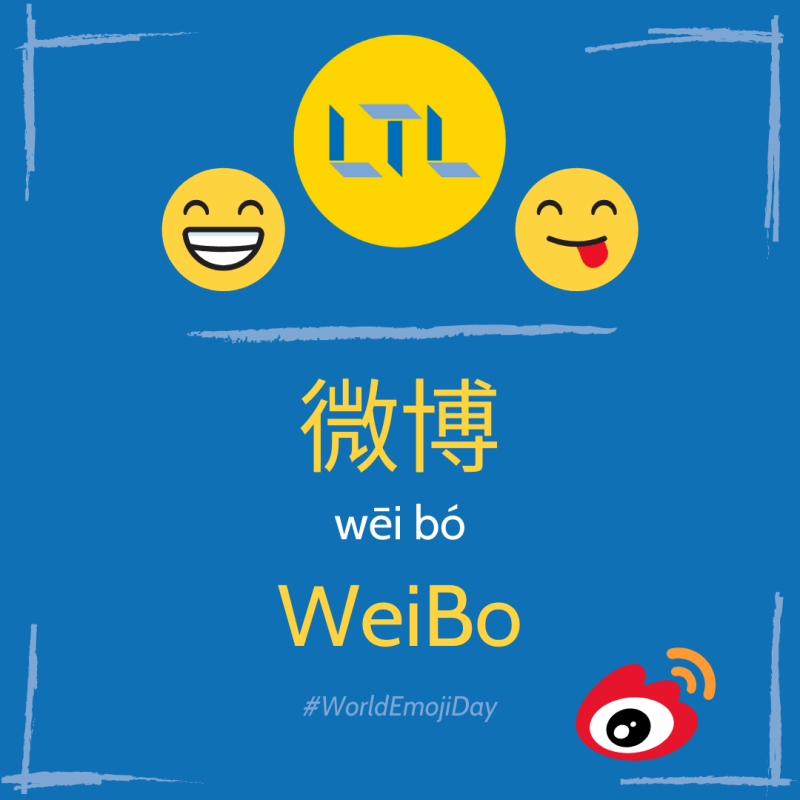
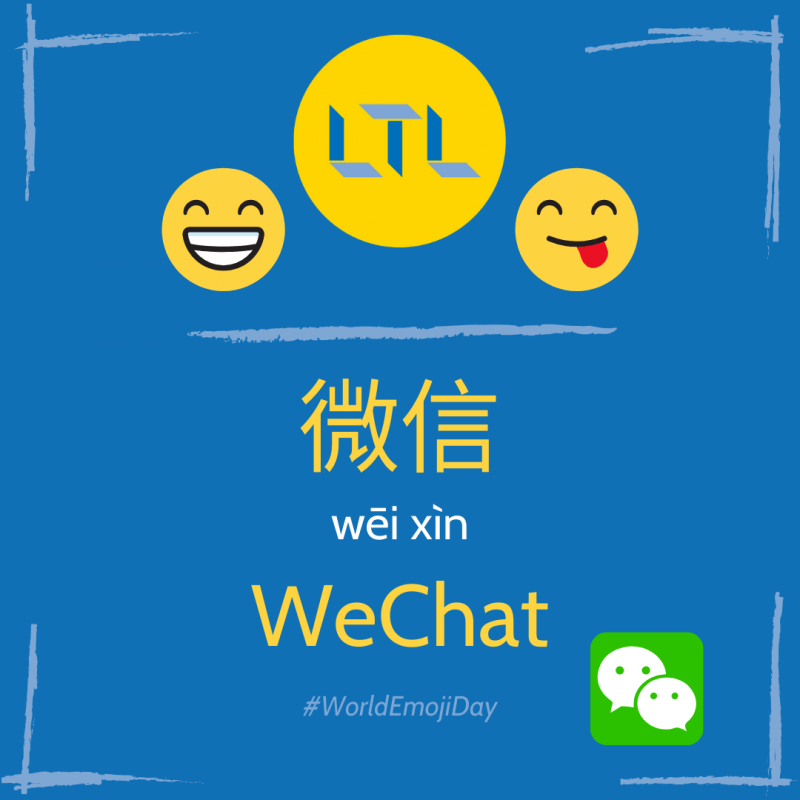

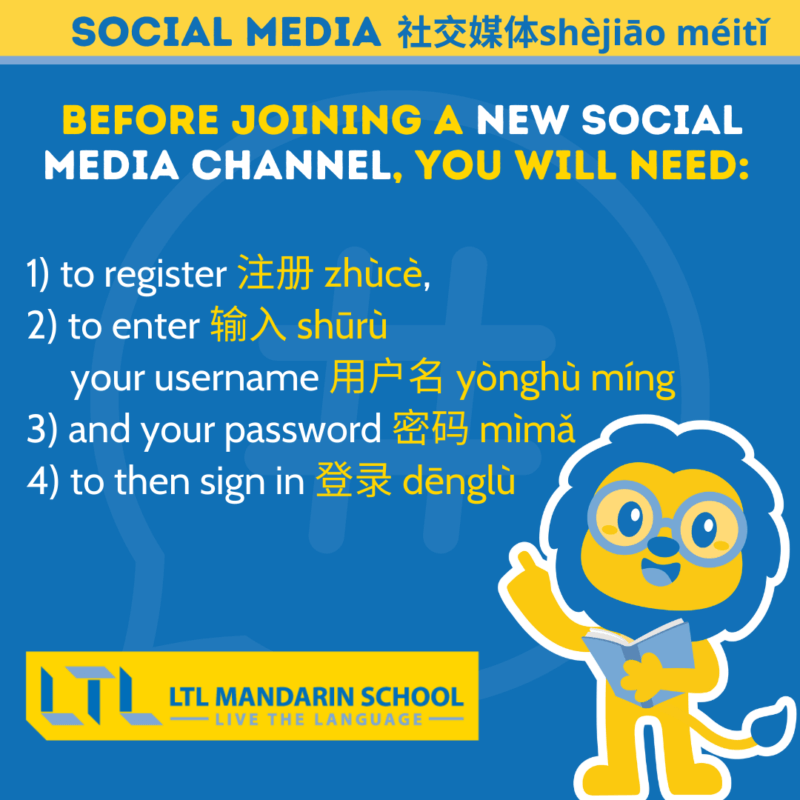
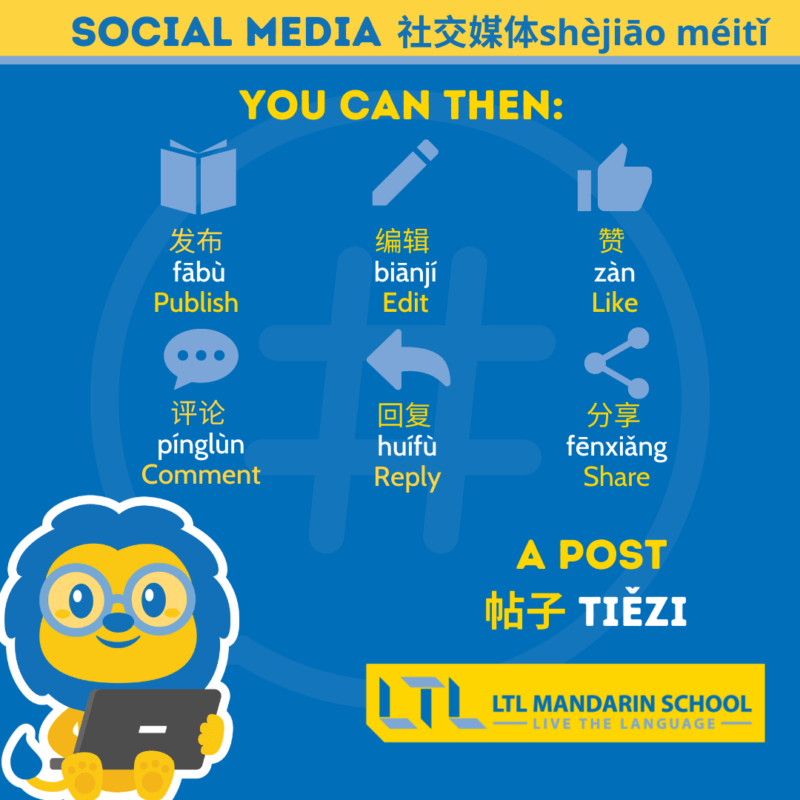
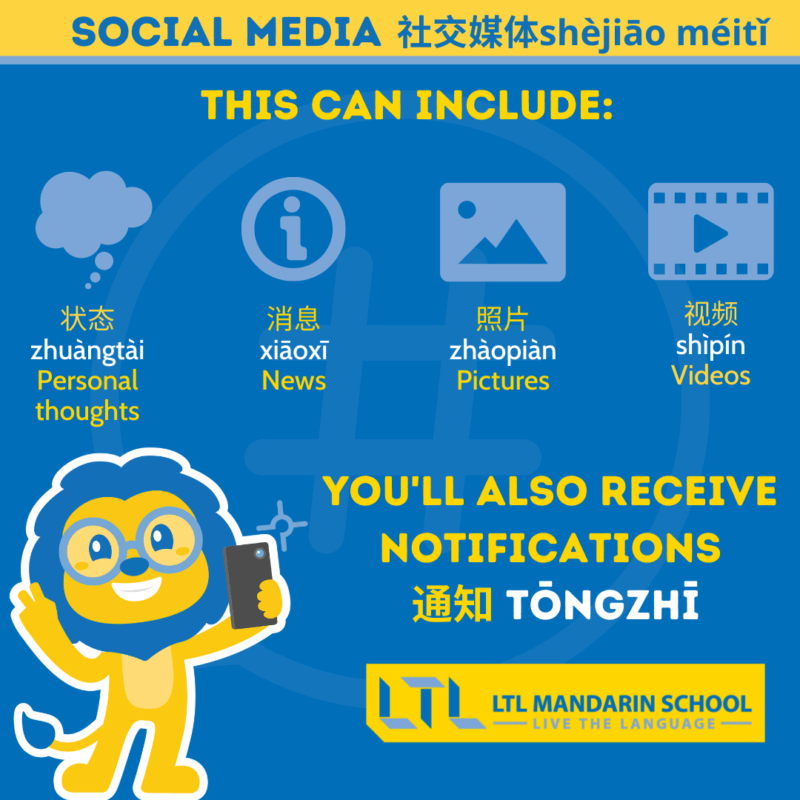
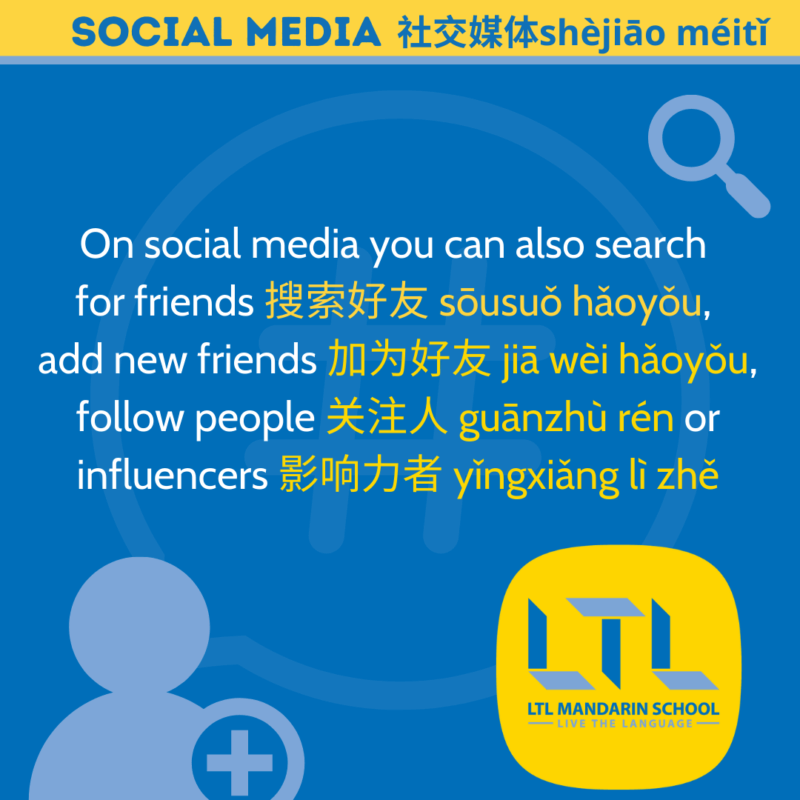



7 comments
Thank you for writing about this topic, I didn’t really know about Media in China. Do you do newsletters?
We do indeed Jennifer – see above there is a WANT MORE FROM LTL tab, pop your email into that and you’ll receive the newsletter 🙂
Why do China do things differently
Good question! Many western social media is banned in China so this would explain why they have their own versions of so many.
Ni men Zhen Bàng le !
多谢 Kenshin
[…] So, if you’re pressed for time and want a quick dose of Mandarin conversation, tune in and listen to one of their many stories on anything from elderly people’s health to Chinese social media. […]